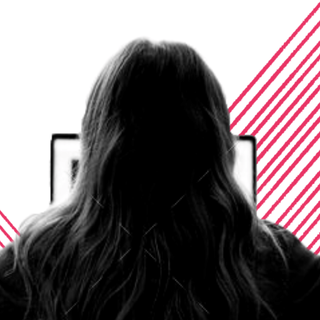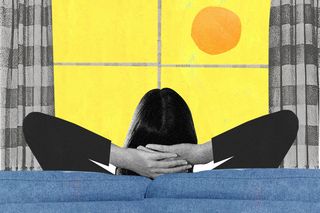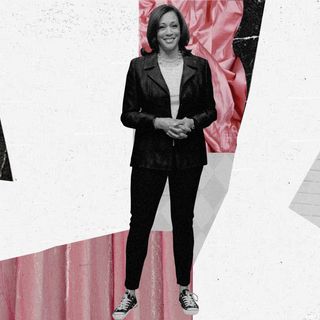
Pandemic Isolation Has Been a Relief for Many Who Don’t Fit into Society’s Norms
From people with autism to those with physical disabilities, respite from traditional social expectations has led to happier, healthier lives.

People have been clamoring to get back to their pre-pandemic lives ever since the pandemic began. They miss their old routines, they say, their friends and colleagues — and, of course, weekend parties. And yet, many who found it difficult to function within society’s earlier norms actually thrived in the altered world the pandemic ushered in — and have no interest in seeing ‘normal’ return.
Divya, 25, is a content specialist who has struggled with her mental health for years. The lockdown not only made it easier for her to be more efficient at work but also helped her strike a better balance between her personal and professional lives.
“It was exhausting to get ready in the morning and put on a brave face. Interacting with people drained me of energy. Performing for society gets tiring after a while,” she says. She can now simply focus on her work, without having to “chit-chat with colleagues.” She says that although there have been difficult days since the lockdown began, she much prefers the new normal.
Just like Divya, Shayonee, 32, too described how working from home has eased her social anxiety.
“When I’m at home, I’m more in control of my surroundings. If there’s something unpleasant that I have to deal with, home is a safe retreat because it’s my sanctuary,” she says. “The onus of interaction when you’re in a different environment becomes too immense, and can trigger my social anxiety.”
The lockdown has taken the pressure of social interactions away in Shayonee’s personal life, too. Armed with the excuse of safety amid a global pandemic, she is continuing to decline invitations even as people have begun socializing. The absence of an external gaze, Shayonee says, has made it easier to deal with certain body image issues she developed after gaining weight due to medication. Pre-lockdown, she would often spiral as she looked at the mirror, criticized her appearance, worried about how the people she was meeting would perceive her. It all culminated in a “vicious cycle” triggering her social anxiety, she says, but no longer.
For people with debilitating anxiety disorders — particularly, social anxiety — social isolation has made life easier.
“Some of my patients report feeling better during the coronavirus lockdown,” Farrah Jarral, a medical anthropologist from the U.K., wrote in The Guardian. In the piece, Jarral describes a patient with social anxiety who “felt as if the rhythm of the world was finally chiming with her own life.”
For others, social interactions can be overwhelming and emotionally and physically exhausting, but with fewer opportunities comes more freedom to be oneself. “We don’t have to put on a facade anymore… We can be exactly who we are — quiet, honest, creative, solitary — and no one is around to judge us for it,” Emily Hu, a licensed clinical psychologist, explained.
Related on The Swaddle:
Has Work‑From‑Home Eliminated ‘Monday Blues’ Or Made Them Worse?
Neuro-atypical people function within a world geared toward a neuro-typical experience for their entire lives. The toll can be exhausting. Experts have hypothesized that the compensatory endeavors of neuro-atypical people to fit into society can lead not only to mood disorders like depression, but also lead to autistic burnout.
“The lockdown has actually been very good for me. I get to do my favorite thing of not meeting other people — basically, I get to be in my own zone, in my own headspace,” says A.B., a 29-year-old lawyer, who is on the autism spectrum.
Writing for NBC News, Khaaliq Crowder spoke about how social isolation helped him come to terms with his diagnosis of Asperger syndrome, which falls within the autism spectrum. “I’m learning to forgive myself for my difficulties, to embrace my unique differences and gifts, and even considering becoming an advocate for neurodiversity instead of hating myself for being weird,” Crowder writes. Before the pandemic, he spent years trying to “change fundamental aspects of [him]self” — code-switching and camouflaging to fit in better with neuro-typical society — which took a toll on his mental health.
Social isolation has also been a boon for those struggling with chronic physical conditions. For A.S., 24, a pre-school teacher with Crohn’s disease, life before the pandemic was difficult, primarily due to the constant fatigue that comes with the disorder.
“Society tends to brush off this fatigue as just exhaustion or tiredness, but the reason I am fatigued is not because I’m tired but because my intestinal lining is inflamed and cannot do a good job of absorbing the nutrients from my diet — no matter how good it is, or how often I eat,” she says.
Having lost a drastic amount of weight due to her condition, she was able to focus on regaining some of it back during the lockdown and later isolation. She set a routine for herself that allowed her to eat and exercise properly as well as to get adequate rest — a routine that had been impossible before due to her exhaustion at the end of a 9-hour workday.”I was finally able to reach my target body weight — something that I’ve been struggling to reach since 2017,” she says.
The new remote and flexible working trends prompted by the lockdown have opened avenues for people like A.S., whose disabilities or other limitations — such as women who bear the sole burden with childcare — to balance self-care and caregiving with a fulfilling occupation.
Vrushali, 23, notes that before the pandemic, companies were so fixated upon physical interactions that they wouldn’t even consider video interviews with potential candidates. Now, she says, companies she has applied to since the lockdown began are not only open to the idea of Zoom interviews but also of future employees working remotely.
However, it remains to be seen whether society will take into account these experiences to build a more inclusive ecosystem in the post-pandemic world. Most of the people interviewed say they have no desire to return to ‘normal’ but would rather see this normal — the one that has space for their lifestyles and needs — take root. The isolation and distance Covid19 responses imposed on the world could yield a contradictory and unexpected outcome: inclusion.
Devrupa Rakshit is an Associate Editor at The Swaddle. She is a lawyer by education, a poet by accident, a painter by shaukh, and autistic by birth. You can find her on Instagram @devruparakshit.
Related


The Kamala Harris Vogue Cover Shows Fashion Magazines Are Struggling for Relevance
